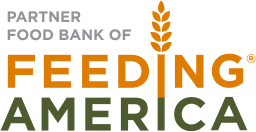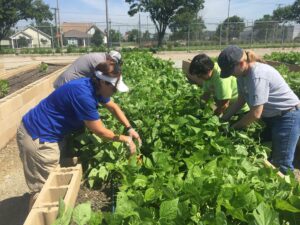By Amber Wright, Development and Marketing Coordinator
With the recent observance of Grandparents Day, we are reminded of the invaluable role that grandparents play in our lives. They bring wisdom, care, and joy, whether in our own families or as pillars of support within our communities.
However, amidst this celebration, it’s crucial to shed light on a growing trend: grandparents stepping up as the primary caregivers for their grandchildren. Regrettably, this arrangement is more likely to experience poverty and hunger than more traditional family structures, with rates of food insecurity being more than 60% higher than all households with children. Currently, 1 in 4 grandparent-headed households are food insecure.
In this blog, we will explore the issue of food insecurity among grandfamilies using insights from the 2022 Grandfamilies Report published by Generations United. This report sheds light on the extent of the problem and offers valuable information to help us understand and address this pressing issue.
What are “Grandfamilies?”
Grandfamilies are families in which grandparents, other adult family members, or close family friends are raising children without the presence of parents in the home. Nearly 2.5 million kids in the United States live in grandfamilies and 2.4 million grandparents are taking on the responsibility of caring for them.
Various circumstances can lead to grandparents or other family members assuming custody of children. Reasons may include severe disability, incarceration, substance abuse issues, deportation, or parental death. Research consistently shows that grandfamilies represent the best alternative for the well-being of the children involved. Sometimes this is formalized through custody transfers, but often it is undertaken informally outside of the legal system.
Why are grandfamilies more at risk of hunger?
Households with children are more at risk of hunger, according to the USDA. Another report by Feeding America revealed 1 in 14 seniors also experience food insecurity. Grandfamilies, by definition, fall within one or both of these vulnerable populations.
The inclusion of children often necessitates childcare, especially when the primary caregiver is a single working adult. Childcare expenses can be exorbitant, pushing household breadwinners to make tough choices, such as leaving their jobs or reallocating funds from other essential expenses like groceries or medication.
Housing presents another challenge. Grandparents who take in children may have previously lived in affordable, comfortable accommodations. However, the addition of children necessitates larger housing, which can be both time-consuming and costly.
Managing these challenges without a corresponding increase in income can become overwhelming. Besides childcare and housing, other expenses such as groceries, increased utilities, school fees, clothing, medical appointments, birthdays, and everyday expenditures gradually erode the household budget.
Many grandparents are on fixed incomes when they take in children, which limits their financial flexibility. Revenue streams such as Social Security, pensions, or retirement savings, provide a consistent but often modest income. This limited income may not keep pace with rising living costs, including food prices.
Observations from The Foodbank
At The Foodbank, we closely monitor trends in need and witness firsthand the impact on individuals and families. Metrics like service utilization and the distribution of food from our warehouse serve as critical indicators. We are seeing increased participation in our weekly Drive Thru, and our partner agencies are reporting the same thing.
Another noticeable trend is the presence of grandparents attending our weekly Drive-Thru events with their grandchildren in tow. We hear stories of accidents, deaths, and other life crises leading these individuals to selflessly assume caregiving responsibilities, regardless of their financial circumstances. We empathize with the challenges these family leaders face as they navigate the economic strains associated with caring for extra mouths.
The Foodbank has implemented several programs to address the needs of child and senior populations. Our Commodity Supplemental Food Program (CSFP), known as the “Senior Box Program,” provides monthly boxes of shelf-stable food items, along with fresh pantry items, to income-eligible adults over 60. While our data cannot be directly linked to specific family structures, we have observed a continued increase in engagement with this program.
Our Good-to-Go Backpack Program equips teachers with kid-friendly meal kits, discreetly slipped into the backpacks of children identified as at risk of hunger. This ensures that they have snacks over the weekend, along with resources for their family members to access additional assistance. Currently, during the school year, we distribute approximately 4,200 of these meal kits each month.
Conclusion
The issue of food insecurity among grandfamilies is an urgent concern that demands attention and action. As we celebrate the vital role of grandparents in our lives, we must also acknowledge the challenges they face when stepping into the role of primary caregivers. By understanding the unique needs of grandfamilies and implementing targeted support measures, we can work together to ensure that no grandparent or grandchild has to endure the pain of hunger. It is our responsibility to provide the necessary assistance to these families, who selflessly take on the task of nurturing and caring for the next generation.
Citations
Feeding America. “Senior Hunger Facts.” https://www.feedingamerica.org/hunger-in-america/senior-hunger-facts.
Generations United. “Children Thrive in Grandfamilies.” May 2023.
23-Children-Thrive-in-Grandfamilies.pdf (gu.org).
Generations United. “2022 Grandfamilies Report.” October 2022.
2022-Grandfamilies-Report-FINAL-WEB.pdf (gu.org).
“National Grandparents Day.” National Days Today,
National Grandparent’s Day 2023: Things Everyone Should Know (nationaldaystoday.com).
O’Connor, Emma. “Black children are raised by relatives, but resources are hard to find.” NBC News, https://www.nbcnews.com/news/nbcblk/black-children-are-raised-relatives-resources-are-hard-find-rcna8119.
Stein, Jeff. “Grandparents are reporting higher rates of food insecurity.” The Washington Post, 4 November 2022, https://www.washingtonpost.com/business/2022/11/04/grandparents-report-food-insecurity/.
United States Department of Agriculture. “Food Insecurity for Households with Children Rose in 2020, Disrupting Decade-Long Decline.” Amber Waves, February 2022, https://www.ers.usda.gov/amber-waves/2022/february/food-insecurity-for-households-with-children-rose-in-2020-disrupting-decade-long-decline/.





No comment yet, add your voice below!